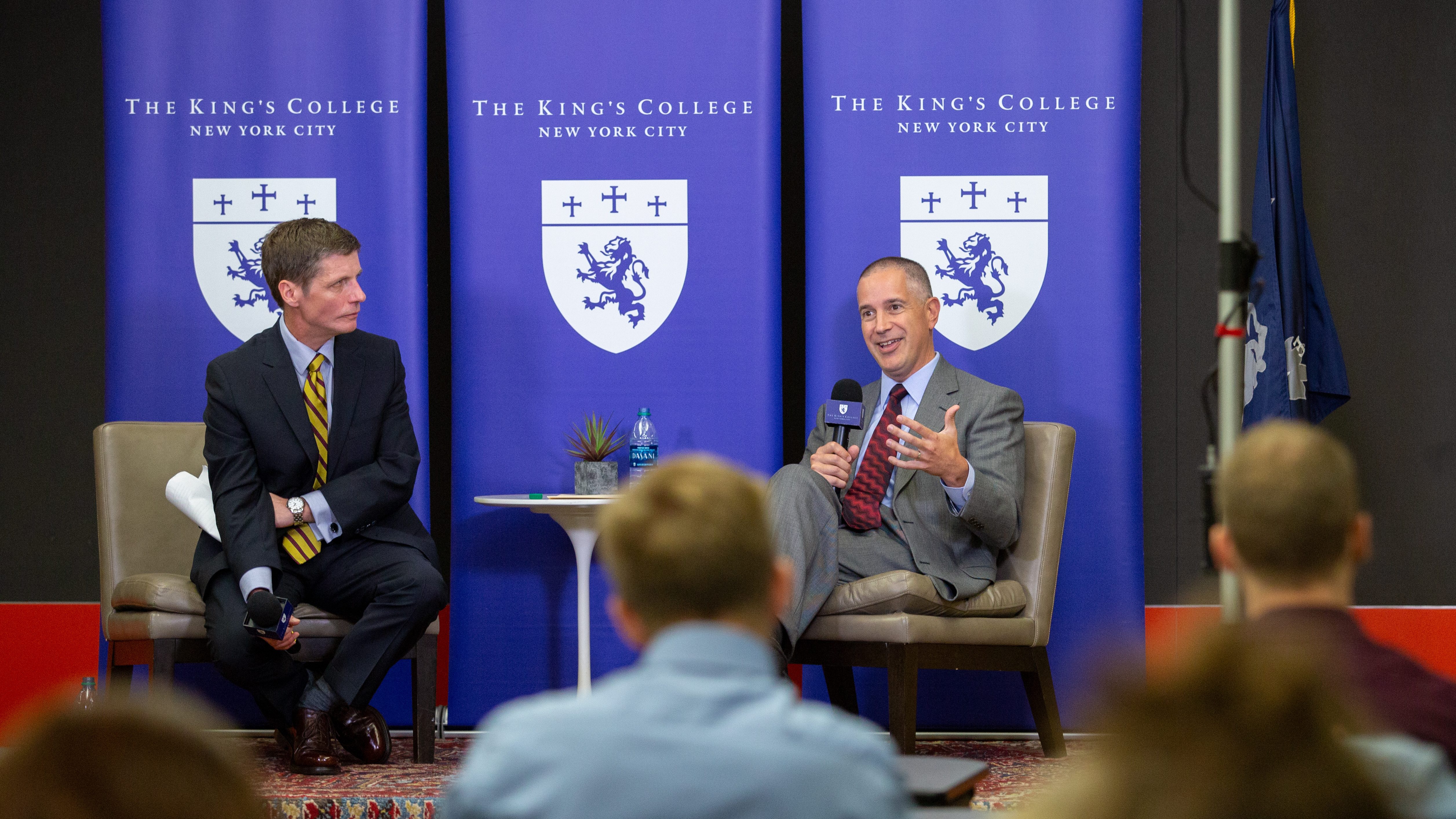Dr. David Tubbs and Prof. Marc DeGirolami Address the Necessity of Constitutional Memory
On September 20, The King’s College celebrated the anniversary of the signing of the U.S. Constitution with a presentation entitled “The Burdens of Constitutional Memory: Slavery, Segregation, and the Supreme Court.”

On September 20, The King’s College celebrated the anniversary of the signing of the U.S. Constitution with a presentation by Dr. David Tubbs, associate professor of politics, entitled “The Burdens of Constitutional Memory: Slavery, Segregation, and the Supreme Court.” Dr. Tubbs was joined by Professor Marc O. DeGirolami, professor of law and associate director of the Center for Law and Religion at St. John’s University. Both professors expressed concerns that popular neglect of constitutional memory has increasingly given the Supreme Court an inordinate and potentially dangerous authority.
WATCH: Tubbs’s and DeGirolami’s Constitution Day Presentation
Tubbs began his lecture with praise for the members of the Constitutional Convention of 1787. Their efforts produced our framework of government, the U.S. Constitution, the enduring success of which is universally extolled. “For much of our history,” Tubbs noted, “the stability of our political institutions has been the envy of many nations.” Still, he reserved his highest praise for the Framers’ humility in allowing for future modifications to the Constitution. The intentionally arduous amendment process detailed in Article 5 is “an instrument of unprecedented value in the West,” Tubbs claimed, before explaining the various ways in which the twenty-seven amendments have displaced, altered, or added to the text of the Constitution over the years.
“Implicit in each amendment is a story,” said Tubbs, and understanding each amendment’s historical context and legal rationale is what he calls “constitutional memory.” This is not mere recollection, but rather a component of civic duty incumbent on each new generation. Evaluating the historical development of the Constitution may uncover past inadequacies or even injustices. “Constitutional memories can be inspiring, but they can also be discouraging and dispiriting,” cautioned Tubbs.
For instance, the history surrounding the Fourteenth and Fifteenth Amendments has blighted our nation’s constitutional memory. Although these amendments were intended to protect newly-freed African Americans, the decades following their ratification witnessed the rise of Jim Crow laws. Worse still, the Supreme Court upheld the legality of racial segregation by a 7-1 majority in the landmark case Plessy v. Ferguson. Despite their later repudiation of Plessy in Brown v. Board of Education, the Supreme Court has never fully recovered from this error, Tubbs said.
Moreover, Tubbs argued, “Rather than admit this failure of constitutional duty, many American judges have seemingly sought to atone for the judiciary’s complicity in buttressing segregation by promulgating a host of new rights in the last five decades.” He then traced a causal connection between Griswold v. Connecticut, Roe v. Wade, and Obergefell v. Hodges, which established the right to privacy, abortion, and same-sex marriage, respectively. These non-enumerated rights remain highly controversial because they originate not from the state legislatures, but rather in “the Court’s usurpation of a legislative function,” which, according to Tubbs, is “a form of overcompensation on the part of the Supreme Court, having failed to protect the basic rights of African Americans before, during, and after Reconstruction.” Tubbs concluded with an exhortation to preserve the Supreme Court’s fallible nature in our constitutional memory, lest we allow judicial activism to undermine the constitutional balance of power.
Dr. David C. Innes, chair of the program in Politics, Philosophy, and Economics, praised Tubbs’s thesis as “provocative,” and said that “the Constitution was certainly honored in this year’s Constitution Day lecture.”
In his response, DeGirolami echoed Tubbs’s concern that judicially-created rights are not grounded in the text of the Constitution, adding that the traditional process of establishing rights through constitutional amendments is “very nearly dead.” DeGirolami cited the meager figure of two amendments passed since 1971. Neither of those amendments, pertaining to voting age requirements and congressional salaries, were particularly controversial at the time of their ratification or since. However, with controversial modern issues such as abortion or same-sex marriage, neither side is likely to garner the support necessary for a constitutional amendment. For this reason, judicially-created rights are zealously guarded by their supporters, and Supreme Court appointments become partisan battlegrounds.
During the Q&A portion of the event, Jan Gerber (PPE ’21) asked what the consequences might be if constitutional memory were to give way to political fragmentation. DeGirolami was frank in his response: “The danger is that we might not live in a democracy any longer. The danger is that laws and rights would be imposed upon us. If we lose the possibility of constitutional memory, then we lose the sense in which the document is our document.”




